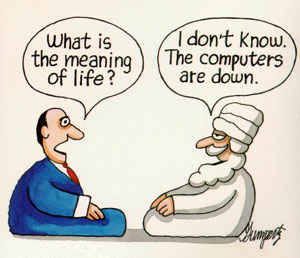At the risk of dwelling on a topic that it may not be edifying to dwell upon, I’m going to circle back to public nudity. (Hang Together has existed for just one month and we’re already establishing a clear brand identity!)
Replying to my argument that the moral imperatives of reproduction alone are insufficient for a shared public morality, Dan wrote that he agreed, but thought that the state specifically should only have a role where reproduction is involved. I asked whether Dan’s position didn’t imply “whole hog libertarianism on everything sexual other than actual intercourse.” After all, as long as intercourse isn’t involved, it would seem reproduction isn’t an issue and thus (by Dan’s theory) the state seemed to be excluded.
So what about banning public nudity? After some back and forth, Dan said:
The state’s interest in the presentation of sexuality in the commons is not an interest in sexuality per se, but in refereeing the interests of two competing actors who have a claim on the commons.
But how is the state to referee these conflicts if it doesn’t know anything about the subject? Suppose actor A does action X in the commons, and actor B goes to the state and makes a claim that X excludes his use of the commons, not because X does direct harm to B but because X degrades the commons in such a way that it makes our moral formation as human beings impossible, such that (as Dan himself admits) the state can exclude it. How is the state to evaluate the claim unless the state understands the moral significance of action X and its impact on the moral formation of human beings?
Law can’t be legitimate if it’s not grounded in a moral consensus. All law presupposes a mroal framework. You can’t ban public nudity without some implied judgment on the moral status of public nudity.
This judgment need not be a total judgment. The state need not decide whether sexuality is an expression of God’s loving nature and marriage is an image of Christ and the church. But it does need to know that flapping your bits around in the town square is wrong.
When the state favors the parents over the pornographers, it is not doing so because it has made an independent moral determination that the pornographer is purveying a harmful metaphysical something. It is responding to the community’s demand that the commons’ floor be set at a certain level.
I agree the state should not make an “independent” determination, but ground its own moral knowledge in the public moral consensus. My point is that the state does need to exercise some kind of moral competence or it can’t do the job you’re asking it to do.
The state must take this role because the pornographers and the parents have mutually exclusive claims to use of the commons. And the state can, and does, draw the line without reference to an absolute moral standard. It simply references community standards.
Not sure what you mean by “absolute” here. But your statement does seem to imply that a moral standard (ultimately, the public’s rather than the state’s) is being codified in law. This implies a need for some level of competence in moral judgment by the state – so it can know and execute the public moral conesnsus.
That’s about all it can legitimately do. Doing more would involve the state in determining what is orthodox. And that it may not do.
I agree the state should not enforce a doctrinal orthodoxy. But the state simply cannot be neutral about whether it is morally OK to flap your bits around in the town square. That option just doesn’t exist.
That is why culture is so important. On these types of questions, when both sides cannot simultaneously do as they wish, culture is the deciding factor. The state, although a cultural actor, simply enforces the decision made by all the other cultural actors.
But how does it enforce a view unless it has some competence to understand that view and pass judgment on what particular actions do and do not conform to it?
Bottom line: The state ought not enforce a total view of the meaning of life, but it cannot by any possible means avoid enforcing at least a partial view of the meaning of life. The choice to ban public nudity presupposes a moral view (ultimately, the public’s moral view) and thus requires the state to know and judge morality to some extent.

I’m curious what your response would be if you were German, given that Munich has ‘commons’ in the form of parks where nudity is allowed!
That actually is another line of inquiry into Dan’s position that I was holding in reserve for later. His justification of excluding degrading sexuality from the commons is that it hinders the moral formation of children. But what about areas of the commons that children don’t use? Can it ever be legitimate to ban degrading sexuality in those areas, or are arrangements such as the one you describe, or the notorious Amsterdam red light district, normative for all cultures?
(Dutch people tell me the Amsterdam red light district has actually been radically cleaned up in recent years and it’s nothing at all like Americans’ popular image of it. But it still works as a way of raising the question. Indeed, it works even better now – why was it that the Dutch found having a no-holds-barred red light district unsustainable?)